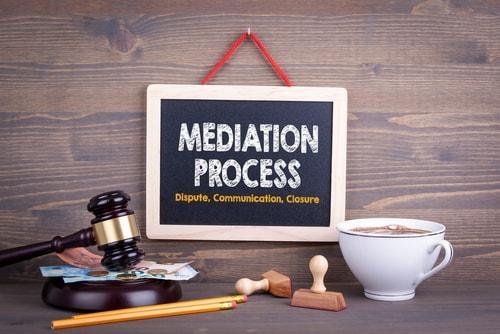Recent Blog Posts
New Maintenance Calculations for 2019 in Illinois Post-Trump Tax Reform: Senate Bill 2289
 As you may know, the Tax Cuts and Jobs Act (TCJA)—better known as Trump tax reform—will change the way in which spousal maintenance affects taxes. In short, after the new year, the spouse making alimony payments will have to pay more money in taxes, while the spouse receiving alimony payments will have to pay less in taxes. However, a new Illinois law considers these federal tax law changes and makes it so that the spouse making payments is not as adversely affected as she or he otherwise might have been. We will say more about how spousal maintenance is taxed, and then we will talk about the calculations for spousal maintenance after 2019 when both laws (federal and state) will take effect.
As you may know, the Tax Cuts and Jobs Act (TCJA)—better known as Trump tax reform—will change the way in which spousal maintenance affects taxes. In short, after the new year, the spouse making alimony payments will have to pay more money in taxes, while the spouse receiving alimony payments will have to pay less in taxes. However, a new Illinois law considers these federal tax law changes and makes it so that the spouse making payments is not as adversely affected as she or he otherwise might have been. We will say more about how spousal maintenance is taxed, and then we will talk about the calculations for spousal maintenance after 2019 when both laws (federal and state) will take effect.
How Spousal Maintenance and Taxation Currently Works
Currently, under Illinois law (750 ILCS 5/504), here is how taxation works when it comes to spousal maintenance: the spouse who makes alimony payments (the payor) can deduct the spousal maintenance payments from his or her income prior to paying taxes, while the spouse who receives alimony payments (the payee) must pay taxes on the spousal maintenance payments in the same way that the spouse would pay taxes on other types of “income.”
Implications of Proposed House Bill 4113: Equal Parenting Time Presumption
 As families that have newly gone through a divorce in DuPage County know, the Illinois Marriage and Dissolution of Marriage Act (IMDMA) was amended relatively recently to do away with the terms of “ child custody” and “visitation.” Amendments to the law changed those terms to “parental responsibilities” and “parenting time,” which reflect the human relationships that exist between parents and their kids and the differences in family structures.
As families that have newly gone through a divorce in DuPage County know, the Illinois Marriage and Dissolution of Marriage Act (IMDMA) was amended relatively recently to do away with the terms of “ child custody” and “visitation.” Amendments to the law changed those terms to “parental responsibilities” and “parenting time,” which reflect the human relationships that exist between parents and their kids and the differences in family structures.
With those changes to the law, Illinois legislators recognized the need for flexibility in allocating important decision-making tasks about a child’s upbringing, as well as flexibility in terms of regular parenting time or spending time with the child and providing caretaking functions. Currently, the IMDMA says the court can take into account a number of different factors in allocating parental responsibilities, which include parenting time.
However, a proposed bill aims to change the presumptions about parenting time in the state. If House Bill 4113 were to pass, courts would have to begin from the presumption that equal parenting time is the best option for all families. We will say more about the potential effects of this bill and what it could mean for different families in DuPage County.
Muslim Arbitration
 Common judicial processes in the U.S., and in DuPage County, in particular, can be problematic for many members of the Muslim community. The American court system functions in a manner that privileges individual rights over collective responsibilities and communities, which can be alienating to Muslims in general and particularly so for members of the Muslim community who are immigrants and are accustomed to different legal, social, cultural, and religious practices. Relying on Muslim arbitration can be one way to handle business disputes and other legal conflicts involving a member of the Muslim community without treading on certain norms that are important to that party.
Common judicial processes in the U.S., and in DuPage County, in particular, can be problematic for many members of the Muslim community. The American court system functions in a manner that privileges individual rights over collective responsibilities and communities, which can be alienating to Muslims in general and particularly so for members of the Muslim community who are immigrants and are accustomed to different legal, social, cultural, and religious practices. Relying on Muslim arbitration can be one way to handle business disputes and other legal conflicts involving a member of the Muslim community without treading on certain norms that are important to that party.
To learn more about Muslim arbitration, first we want to say more about arbitration generally. Then we will provide you with some background information about Muslim arbitration in the United States.
What Is Arbitration and Why Is It Beneficial?
Arbitration is a form of alternative dispute resolution (ADR). It is a process that is non-judicial and private through which disputing parties agree that one or several individuals can make a decision about the dispute after receiving evidence and hearing arguments.
Conflict Resolution
 Resolving legal conflicts in business and other areas can be complicated and frustrating for anyone, but the prospect of conflict resolution can feel even more daunting — and potentially biased — for members of the Muslim community. Common legal practices in the West rely on rules and individual responsibility, and as such, lawsuits are routine and necessary. Such practices can corrupt the ethical assumptions and religious or sociocultural practices of persons who do not ascribe to Western norms. All of this is to say that conflict resolution, particularly involving members of the Muslim community, can be complicated in relation to the U.S. judicial system.
Resolving legal conflicts in business and other areas can be complicated and frustrating for anyone, but the prospect of conflict resolution can feel even more daunting — and potentially biased — for members of the Muslim community. Common legal practices in the West rely on rules and individual responsibility, and as such, lawsuits are routine and necessary. Such practices can corrupt the ethical assumptions and religious or sociocultural practices of persons who do not ascribe to Western norms. All of this is to say that conflict resolution, particularly involving members of the Muslim community, can be complicated in relation to the U.S. judicial system.
Lawyers who regularly work with members of the Muslim community are trained to think outside of the box and to come up with unique solutions to legal and business disputes that arise between and among community members. There are multiple methods of alternative dispute resolution (ADR), and other non-judicial options, for resolving conflicts.
Mediation for Muslims: Business Disputes
 Business disputes arise in many different contexts, from disputes with suppliers or employees to disputes among co-owners of the business. Given that corporate law as it is practiced in the U.S. tends to be very Western and individualistic in its approach, it can be difficult for members of the Muslim community to integrate their own cultural and religious practices into the existing corporate law structures. For example, the practice of taking a business dispute to court can come into conflict with a Muslim business owner’s religious and cultural practices for resolving disputes.
Business disputes arise in many different contexts, from disputes with suppliers or employees to disputes among co-owners of the business. Given that corporate law as it is practiced in the U.S. tends to be very Western and individualistic in its approach, it can be difficult for members of the Muslim community to integrate their own cultural and religious practices into the existing corporate law structures. For example, the practice of taking a business dispute to court can come into conflict with a Muslim business owner’s religious and cultural practices for resolving disputes.
When Western jurisprudence seems to diverge from the principles of Islamic law or Islamic cultural practices more generally when determining the outcome of a business dispute, the parties may consider turning to mediation. A form of alternative dispute resolution (ADR), mediation allows parties to a dispute to play an important role in the outcome of the situation all while being flexible with regard to the practices and styles of the mediation space.
Mediation for Muslims: Family/Divorce Issues
 There are many different reasons that family law conflicts can arise in DuPage County, from one spouse’s desire to file for divorce to difficulty coming to an agreement over a parenting plan after a marriage has been dissolved. Mediation can be extremely helpful for many families and in many different legal contexts. To be sure, there are benefits to mediation that simply do not exist in a courtroom. However, it can be difficult for Muslim individuals and Muslim families to find a mediation model that fits religious and cultural values, as well as the parties’ religious and cultural upbringings.
There are many different reasons that family law conflicts can arise in DuPage County, from one spouse’s desire to file for divorce to difficulty coming to an agreement over a parenting plan after a marriage has been dissolved. Mediation can be extremely helpful for many families and in many different legal contexts. To be sure, there are benefits to mediation that simply do not exist in a courtroom. However, it can be difficult for Muslim individuals and Muslim families to find a mediation model that fits religious and cultural values, as well as the parties’ religious and cultural upbringings.
As such, it is important to work with an experienced DuPage County family law attorney who has experience serving members of the Muslim community. At Farooqi & Husain Law Office, we are dedicated to providing compassionate and informed counsel to Muslims in Oakbrook Terrace and throughout DuPage County.
Why It Is Important to Consider Mediation for Muslims
Applying for Citizenship/Naturalization
 The process of applying for citizenship in the United States has always been a long and complex one, but it is becoming more difficult and complicated more recently with political and legal changes taking place. Many Muslims in DuPage County have questions and concerns about the citizenship or naturalization process. Naturalization is the process through which a foreign citizen obtains U.S. citizenship. Sometimes Muslim families in Oakbrook Terrace need help with the naturalization process for a family member who is currently a citizen of another country. In other cases, Muslim residents of DuPage County may be living and working in the U.S. on a visa but want to begin the naturalization process in order to become a U.S. citizenship.
The process of applying for citizenship in the United States has always been a long and complex one, but it is becoming more difficult and complicated more recently with political and legal changes taking place. Many Muslims in DuPage County have questions and concerns about the citizenship or naturalization process. Naturalization is the process through which a foreign citizen obtains U.S. citizenship. Sometimes Muslim families in Oakbrook Terrace need help with the naturalization process for a family member who is currently a citizen of another country. In other cases, Muslim residents of DuPage County may be living and working in the U.S. on a visa but want to begin the naturalization process in order to become a U.S. citizenship.
At Farooqi & Husain Law Office, we know how frustrating and difficult immigration law issues surrounding citizenship and naturalization can be. We have years of experience serving members of the Muslim community, and we can answer your questions about the naturalization process today.
Cultural Awareness in a Law Firm: Importance of Understanding Muslim, Indian, and/or Pakistani Cultures to Solve Problems
 When you are facing a significant legal matter, whether it is a family law matter such as a divorce or a business dispute, you want to have an experienced attorney who understands your background and the specific cultural issues that may be affecting or influencing your case. While many lawyers and clients alike do not immediately think about the ways in which cultural or religious differences can impact a divorce case or a commercial law contract, it is important to consider how these differences can influence one or both parties and for everyone involved in the case to respect such cultural differences.
When you are facing a significant legal matter, whether it is a family law matter such as a divorce or a business dispute, you want to have an experienced attorney who understands your background and the specific cultural issues that may be affecting or influencing your case. While many lawyers and clients alike do not immediately think about the ways in which cultural or religious differences can impact a divorce case or a commercial law contract, it is important to consider how these differences can influence one or both parties and for everyone involved in the case to respect such cultural differences.
In particular, members of the Muslim community, especially with familial ties to India and Pakistan, tend to have different cultural understandings and practices than the ones that are more typical of Western societies. We want to say more about the importance of cultural awareness and respect in solving legal problems.
What Is Alimony?
 Getting divorced can take a significant financial toll on any couple or family, especially when just one of the spouses was the primary earner. Whether one spouse stayed at home during the marriage to raise children or simply had a lower earning job, divorce can be extremely difficult when parties begin living on only one income. Alimony, which is known as spousal maintenance under Illinois law, is a term to describe a maintenance payment from one spouse to the other in order to account for substantial differences in income levels as a result of the divorce. Spousal maintenance is not awarded in all divorces, but it is awarded in many of them.
Getting divorced can take a significant financial toll on any couple or family, especially when just one of the spouses was the primary earner. Whether one spouse stayed at home during the marriage to raise children or simply had a lower earning job, divorce can be extremely difficult when parties begin living on only one income. Alimony, which is known as spousal maintenance under Illinois law, is a term to describe a maintenance payment from one spouse to the other in order to account for substantial differences in income levels as a result of the divorce. Spousal maintenance is not awarded in all divorces, but it is awarded in many of them.
Factors for Awarding Spousal Maintenance in Illinois
In order for one spouse to receive alimony or spousal maintenance from the other spouse, the spouse seeking the maintenance must request it. The first step the court takes when it receives a request for spousal maintenance is to determine whether it is appropriate. In other words, should the spouse who wants maintenance receive it?
What Is Marital Property?
 Filing for divorce in DuPage County can be complicated and frustrating when you do not have the help of an experienced lawyer on your side, especially when it comes to the division of marital property. One of the most contentious issues in divorces is property division. Under Part V of the Illinois Marriage and Dissolution of Marriage Act (IMDMA), marital property is divided according to a theory of division known as equitable distribution. This means that all marital property will be divided in a way that the court considers fair—but not necessarily equal—to both parties.
Filing for divorce in DuPage County can be complicated and frustrating when you do not have the help of an experienced lawyer on your side, especially when it comes to the division of marital property. One of the most contentious issues in divorces is property division. Under Part V of the Illinois Marriage and Dissolution of Marriage Act (IMDMA), marital property is divided according to a theory of division known as equitable distribution. This means that all marital property will be divided in a way that the court considers fair—but not necessarily equal—to both parties.
Yet in order to understand how the equitable distribution of marital property might work, it is essential to understand how the court classifies marital property.
Marital Versus Non-Marital Property in Illinois
How does the statute define marital property? The IMDMA says that marital property includes any property obtained by either spouse subsequent to the marriage. In other words, any property, whether it is an asset or a debt, that either of the spouses acquired after getting married is classified as marital property. However, there are some exceptions to this rule.


 630-909-9114
630-909-9114




